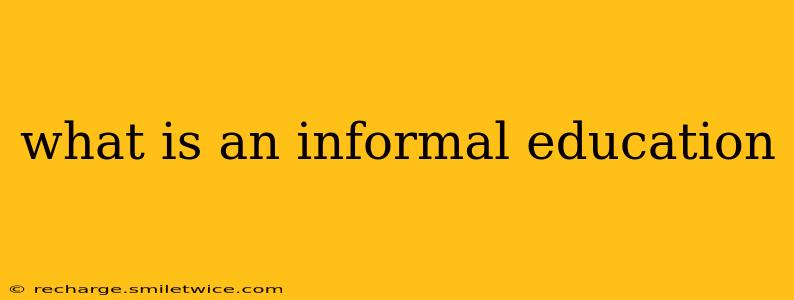Informal education is a powerful and often overlooked aspect of learning. Unlike formal education, which takes place in structured settings like schools and universities, informal education encompasses all the learning experiences that occur outside of these traditional environments. It's the constant, evolving process of acquiring knowledge and skills throughout our lives, shaping our understanding of the world and ourselves. This article delves into the nuances of informal education, exploring its various forms and its profound impact on personal growth and societal development.
What are some examples of informal education?
Informal education manifests in countless ways, making it a truly ubiquitous aspect of human experience. Here are some key examples:
-
Experiential Learning: This is arguably the cornerstone of informal education. Learning by doing, through practical experiences, is a powerful way to acquire knowledge and skills. This could range from learning to ride a bike to building a piece of furniture, or even navigating a new city.
-
Family and Community Influences: Our families and communities play a vital role in shaping our values, beliefs, and behaviors. We learn language, social norms, and cultural practices through interactions with family members and community members.
-
Self-Directed Learning: This encompasses any pursuit of knowledge driven by personal interest and curiosity. Reading books, watching documentaries, or exploring hobbies are all examples of self-directed learning.
-
Social Interactions: Conversations, discussions, and collaborations with peers, colleagues, and mentors contribute significantly to our learning journey. The exchange of ideas and perspectives broadens our understanding and challenges our assumptions.
-
Media and Technology: News, social media, television, and online resources are readily available sources of information. While these platforms need careful critical evaluation, they undoubtedly play a significant role in contemporary informal learning.
-
Travel and Exploration: Exposure to different cultures, environments, and perspectives broadens our understanding of the world, fostering empathy and intellectual curiosity.
How does informal education differ from formal education?
The key distinctions between formal and informal education lie in their structure, goals, and assessment methods. Formal education is typically structured, with defined curricula, assessments, and qualifications. Informal education, on the other hand, is often unstructured and self-directed, with learning outcomes less easily measured.
What are the benefits of informal education?
The benefits of informal education are numerous and far-reaching:
-
Enhanced Creativity and Problem-Solving Skills: Hands-on experiences foster creativity and encourage innovative approaches to problem-solving.
-
Increased Self-Confidence and Independence: Self-directed learning cultivates self-reliance and builds confidence in one's abilities.
-
Lifelong Learning: Informal education enables individuals to continue learning throughout their lives, adapting to changing circumstances and pursuing personal interests.
-
Improved Social and Emotional Development: Interactions with diverse individuals and communities foster empathy, understanding, and social skills.
-
Supplements Formal Education: Informal education can enhance and supplement the knowledge acquired through formal schooling.
Is informal education important?
Yes, informal education is incredibly important. It complements formal education, providing a rich tapestry of learning experiences that shape our personal and professional lives. It's a continuous process that fuels personal growth, societal progress, and adaptation to the ever-evolving world around us. It's not a secondary form of learning; it's an integral part of the human experience.
What are the challenges of informal education?
While informal education offers significant benefits, it also presents some challenges:
-
Lack of Structure and Guidance: The unstructured nature of informal learning can sometimes make it difficult to track progress or ensure that learning is focused and effective.
-
Inconsistent Quality: The quality of information and resources available through informal learning can vary significantly.
-
Limited Recognition and Accreditation: Unlike formal education, informal learning experiences are not always formally recognized or accredited, potentially limiting career opportunities.
How can I make the most of informal education?
By actively seeking out learning opportunities, cultivating curiosity, and engaging in diverse experiences, you can significantly enrich your informal education. Be intentional about your learning, seeking out credible sources, reflecting on experiences, and applying new knowledge and skills. Embrace lifelong learning as a continuous journey of discovery and growth. Informal education is not just something that happens to you; it’s something you actively create.
